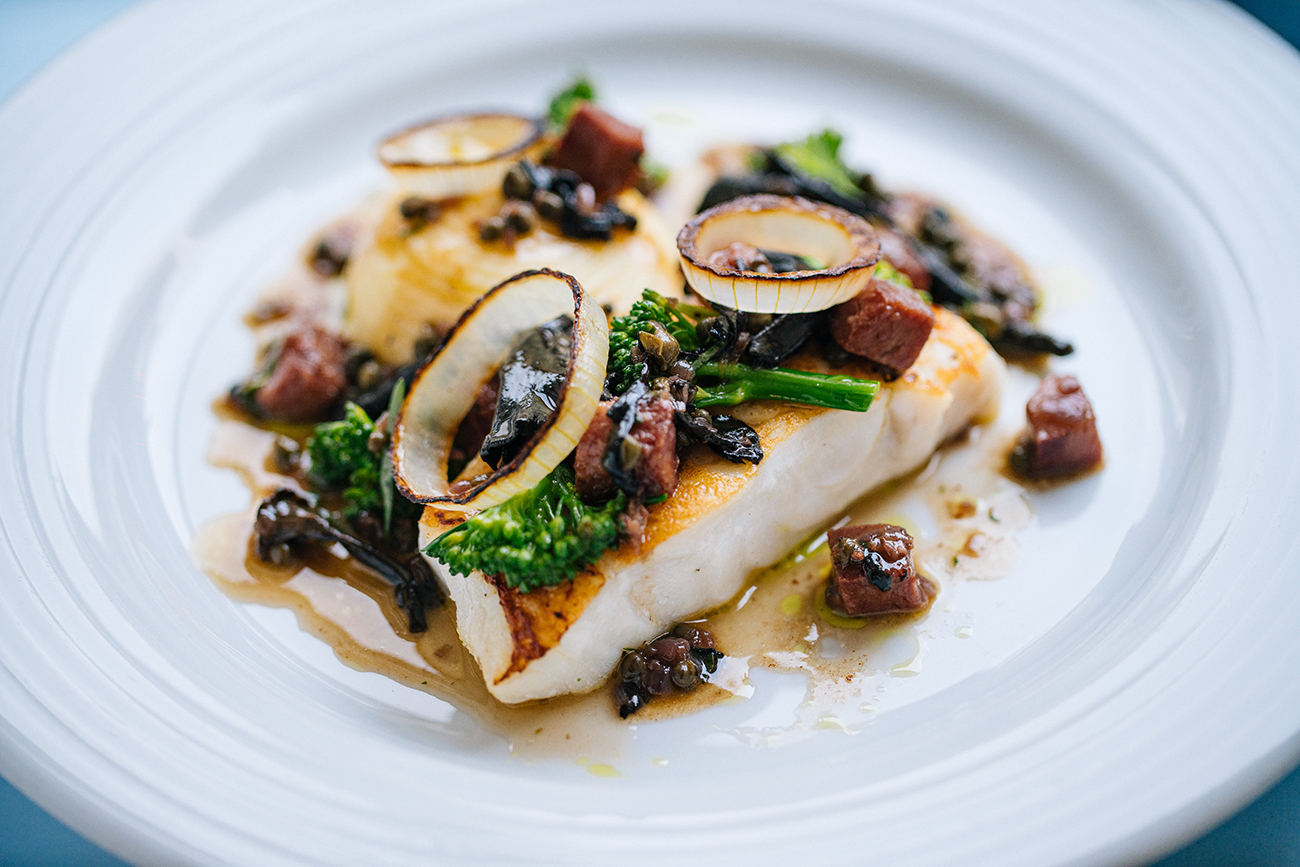
Wild West: Foodie Experiences in West Cornwall
Cornwall’s food scene is much more than Michelin stars, sleek waterfront restaurants and the plush dining rooms of luxury hotels. In the wild westerly corner of Penwith, Lucy Studley meets seven local food and drink pioneers; chefs who are getting their hands dirty with day boat hauls, freshly-dug veg and foraged finds, and neighbourhood wine merchants pouring organic and natural wines with infectious enthusiasm…
The closer you get to Land’s End, the wilder it gets. The locals have a glint in their eyes as they tell me this, sat at the well-stocked bar at The Gurnard’s Head – an old coaching inn near Zennor which is painted a violent shade of mustard. Presumably this is to help you spot it through the thick mist which often descends in this corner of Cornwall, adding to the other-worldly feel. Because there certainly is something in the air, or water, around here. Michael Morpurgo set many of his mythological children’s tales in Penwith, “at the furthest edge of Britain, where the sea gently washes over the land and myths brush against reality”.
Under the creative eye of Head Chef Max Wilson, the food at The Gurnard’s Head embraces these elemental surroundings and celebrates them in open-hearted honesty. After days tramping the moorland and coast path, discovering Neolithic monuments and secluded, wave-battered coves, what could be better than a supper comprised of pork belly served with quince, black pudding and mashed potato, or local cod paired with Jerusalem artichokes and pancetta alongside a rich gratin of smoked cod and leeks? Evenings ensconced by the fire, with the only lights coming from nearby farms and hamlets, are a real indulgence thanks to an extravagantly good wine list (which reads more like the work of a slightly batty collector than an exercise in standard industry mark-ups).
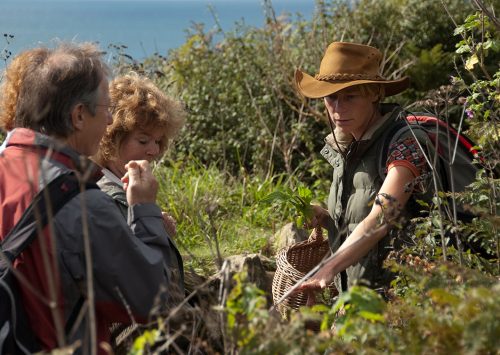
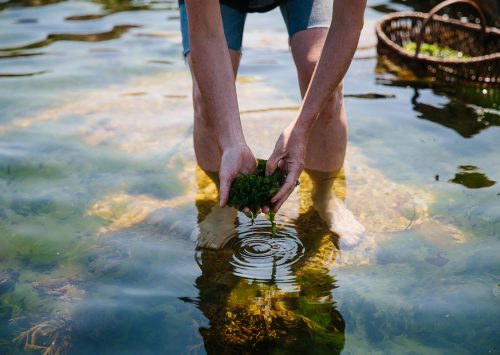
Like the vast majority of chefs in the South West, Max is guided in his menus by the seasonal availability of fresh produce, seafood landed in Cornwall and meat sourced from local suppliers. He is also the lucky recipient of neighbourhood food parcels; lobster pots dispense their bounty from the cove below the Gurnard’s Head, local growers raid their veg patches and greenhouses on his behalf, and foragers scour the hedgerows and shoreline for wild ingredients.
One local pioneer of the foraging movement is Caroline Davey, a former ecological consultant who began supplying restaurants with foraged produce 10 years ago. She diversified and set up a wild food cookery school – Fat Hen – to pass the skills of finding, identifying, harvest- ing, preparing and cooking wild food on to others. From her base near St Buryan, Caroline takes small groups on seasonal foraging missions, returning with a bounty of produce to transform into creative dishes with the help of an experienced team of chefs.
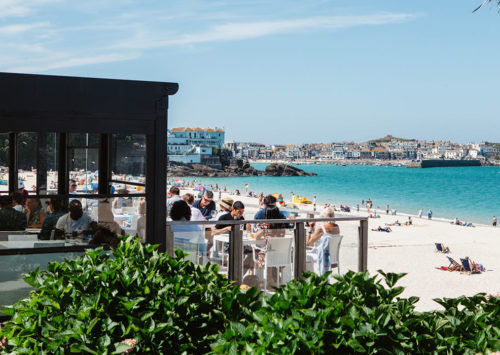
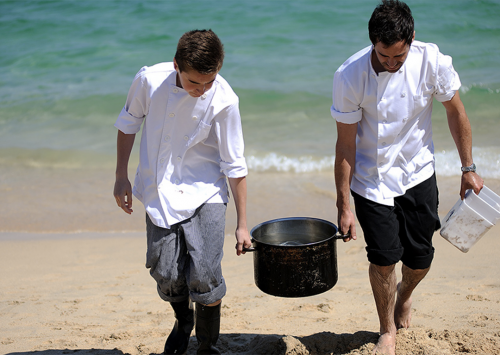
Mick Smith of Porthminster Beach Café in St Ives was one of the first chefs in Cornwall to include foraged food on his menus and, like Caroline, he is now passing the skills on to others. His kitchen brigade forage along the coast path and shoreline every day, searching out ingredients like sorrel, horseradish, pennywort, wild garlic,
samphire and various seaweeds. Their wild finds supplement the vegetables, fruit, leaves and herbs grown in the restaurant’s coastal kitchen garden. “Making the most of the garden and available wild food means that we naturally take our lead from what is in season,” explains Mick. “It gives everything a natural rhythm, and our menus an innate variety.”
The natural harvest complements the fresh seafood which predominates on the menu at this acclaimed beach restaurant. As much as possible is sourced from St Ives Bay, some of which is freshly hauled to shore by the chefs themselves.
Fisherman Toby Wright beaches his small vessel just long enough for one of the chefs to wade into the water and grab a couple of crates of freshly-caught fish – most often mackerel. Mick’s favourite local ingredient; mackerel is healthy, versatile and sustainable. He uses it in various guises – pickled, cured, blackened, pressed, dehydrated to name but a few – but always with delicious results.
Learning to forage, gather seaweed and tend the garden is part of the training for Mick’s team; muddy knees and an occasional unintended dip in the sea are all part of the job description. Some of their freshly plucked natural ingredients have found their way into Porthminster’s very own gin. Made with foraged botanicals and distilled at Colwith Farm Distillery, the gin has a distinctive coastal edge and is served at the Beach Café with lime, samphire and purple violets.
If alcoholic infusions sound like a good route into foraging, check out the courses on offer at Wild St Ives. Josh Quick is a social entrepreneur and a member of the Association of Foragers who runs a programme of botanical walks in beautiful locations in and around St Ives Bay. As well as tree identification and wild food forays, Wild St Ives hosts fun and informative courses on selecting your own botanical blends to infuse into alcohol, and creating cocktails using wild ingredients – all in the name of reconnecting with nature of course!
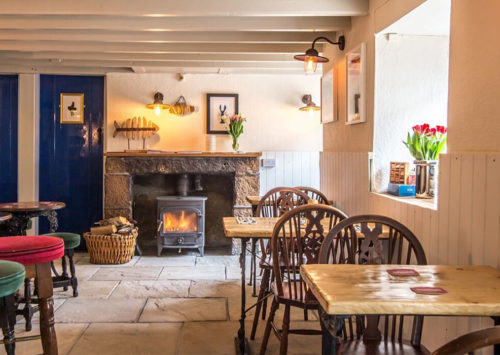
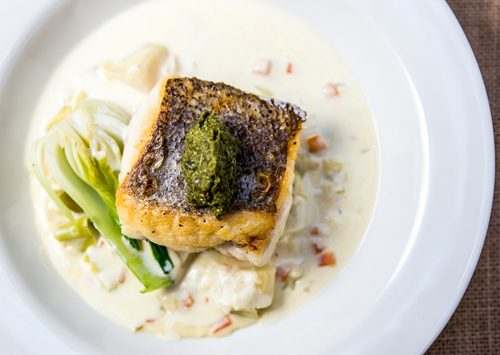
Over on the South coast, at The Tolcarne Inn in Newlyn, another local pioneer is at work. Ben Tunnicliffe was one of the first chefs in Cornwall to be awarded a Michelin Star, yet when he embarked on his first solo-venture in 2012 he opted to open a modest pub rather than chase the stars in the world of fine-dining. Despite its low-key appearance and humble surroundings in a working fishing port, Ben has firmly established The Tolcarne Inn as one of the best places to enjoy fresh seafood in the whole of the UK. His menus are inspired by an early morning conversation with his fishmonger before being chalked up on the board. Like Mick, Ben also sources fish direct from small day boats which go in and out with the tides, fish immediately offshore, and use traditional and sustainable fishing techniques to catch their low-impact quotas.
At The Tolcarne, fish and shellfish are partnered with fresh produce from market gardens like Alsia Cross near St Buryan, and community farms such as Bosavern in St Just. Ben’s approach is to combine flavours simply and instinctively, letting the quality of the key components speak for themselves. This fixation with provenance and respect for raw ingredients is an ethos Ben shares with Rohit Patkar, although in Rohit’s case it’s wine which is the object of his obsession. You’ll find him at his neighbourhood wine bar, Lovetts, most evenings, dispensing an inspired selection of low-intervention wines from behind the tiny counter; there’s a story behind each bottle and you’ll soon be mesmerised as Rohit spins tale after tale, flitting from Austrian natural wines to new-wave South African finds whilst extolling the benefits of biodiversity in organic vineyards.
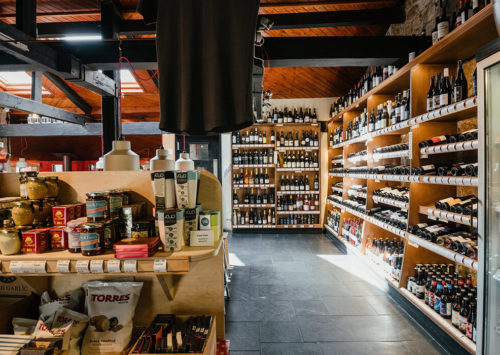
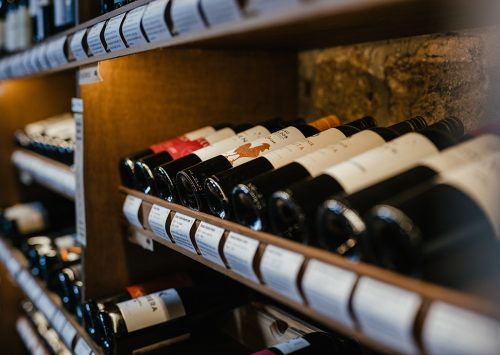
Lovetts is relatively new on the scene, whereas Scarlet Wines at Lelant has been enticing locals with the promise of interesting wine for nearly a decade. Owner Jon Keast is a curator of wines from Europe’s kaleidoscope of terroirs, focusing on indigenous grape varieties and idiosyncratic wines full of regional character.
West Cornwall’s wild edge has appealed to mavericks from all walks of life for centuries; artists, writers, musicians, environmentalists, entrepreneurs – and now food pioneers. Taking inspiration from the rugged coastal scenery and the plenitude of local produce from land and sea, they have made this corner of Cornwall a memorable destination for travellers with a rebellious, enquiring spirit, who seek out quality and distinctiveness above all else.

